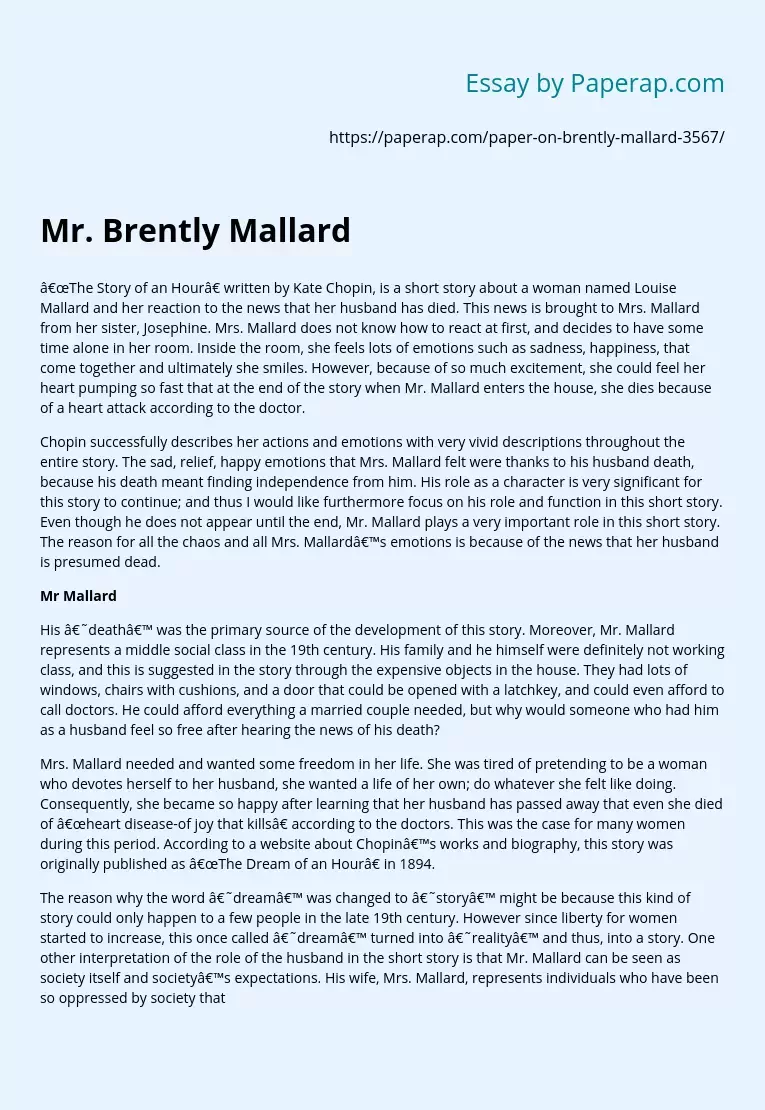Mr. Brently Mallard
“The Story of an Hour” written by Kate Chopin, is a short story about a woman named Louise Mallard and her reaction to the news that her husband has died. This news is brought to Mrs. Mallard from her sister, Josephine. Mrs. Mallard does not know how to react at first, and decides to have some time alone in her room. Inside the room, she feels lots of emotions such as sadness, happiness, that come together and ultimately she smiles. However, because of so much excitement, she could feel her heart pumping so fast that at the end of the story when Mr.
Mallard enters the house, she dies because of a heart attack according to the doctor.
Chopin successfully describes her actions and emotions with very vivid descriptions throughout the entire story. The sad, relief, happy emotions that Mrs. Mallard felt were thanks to his husband death, because his death meant finding independence from him. His role as a character is very significant for this story to continue; and thus I would like furthermore focus on his role and function in this short story.
Even though he does not appear until the end, Mr. Mallard plays a very important role in this short story. The reason for all the chaos and all Mrs. Mallard’s emotions is because of the news that her husband is presumed dead.
Mr Mallard
His ‘death’ was the primary source of the development of this story. Moreover, Mr. Mallard represents a middle social class in the 19th century.
His family and he himself were definitely not working class, and this is suggested in the story through the expensive objects in the house. They had lots of windows, chairs with cushions, and a door that could be opened with a latchkey, and could even afford to call doctors. He could afford everything a married couple needed, but why would someone who had him as a husband feel so free after hearing the news of his death?
Mrs. Mallard needed and wanted some freedom in her life. She was tired of pretending to be a woman who devotes herself to her husband, she wanted a life of her own; do whatever she felt like doing. Consequently, she became so happy after learning that her husband has passed away that even she died of “heart disease-of joy that kills” according to the doctors. This was the case for many women during this period. According to a website about Chopin’s works and biography, this story was originally published as “The Dream of an Hour” in 1894.
The reason why the word ‘dream’ was changed to ‘story’ might be because this kind of story could only happen to a few people in the late 19th century. However since liberty for women started to increase, this once called ‘dream’ turned into ‘reality’ and thus, into a story. One other interpretation of the role of the husband in the short story is that Mr. Mallard can be seen as society itself and society’s expectations. His wife, Mrs. Mallard, represents individuals who have been so oppressed by society that this oppression later on comes to be a disease that is carried for the rest of their lives.
Comparing these characters with a society and the people living in it, these individuals are not able to live alone when they want to break out of society (shown through the death of Mrs. Mallard). Humans are beings that cannot survive alone; and thus, we need a group of people, a society. Nevertheless, we always have something to complain about in the society we live in. Chopin lived in an age where women and men had clear roles in society. Men were the ones who worked and financially supported the family; middle class women supported the family by staying at the house, taking care of the kids, doing the laundry, etc.
Women in the 19th century could not even dream about studying for a high degree or even having a job outside the house. It was a male-based society and because of this, the boom of feminist people began to rise. Chopin thus successfully expressed women’s feelings through her literary work, “The Story of an hour”. Bibliography Koloski, Bernard. “Kate Chopin ‘The Story of an Hour’: When “The Story of an Hour” was written and published. ‘” KateChopin. org. Kate Chopin International Society, 1 Oct. 2011. http://www. katechopin. org/the-story-of-an-hour. shtml#characters. 14 Oct. 2011.
Mr. Brently Mallard. (2019, Dec 05). Retrieved from https://paperap.com/paper-on-brently-mallard-3567/

